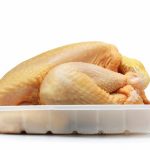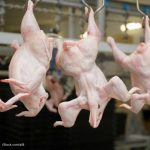A new study from the USDA shows that most people don't wash hands while preparing food. In fact, about 97% of people in a study commissioned by that agency do not properly wash their hands while in the kitchen. Failure to wash hands while preparing food can lead to cross-contamination and cause food poisoning. Carmen Rottenberg, Acting Deputy Under Secretary for Food Safety at the USDA said in a statement, "As a mother of three young children, I am very familiar with the mad dash families go through to put dinner on the table. You can’t see, smell or feel bacteria. By simply washing your hands properly, you can protect your family and prevent that bacteria from contaminating your food and key areas in your kitchen." The observational study was conducted by the USDA with RTI … [Read more...]
USDA Offers Tips for Spring Gatherings
As spring celebrations approach, the USDA is offering food safety tips for these gatherings of family and friends. Foodborne illness causes 128,000 hospitalizations and 3,000 deaths every year. These tips will help keep you and your family safe as you celebrate. Always clean your hands with warm soapy water before and after handling food. Thoroughly wash cutting boards, countertops, and utensils with hot soapy water. Always use separate cutting boards for ready-to-eat foods and for raw foods that are cooked before serving. That's how you prevent cross-contamination. Use a food thermometer when you cook. The USDA has a Safe Minimum Internal Temperature Chart that will guide you. Follow the temperatures and instructions to the letter. Beef, pork, veal, and lamb intact cuts such … [Read more...]
Trends in Food Recalls Finds Recalls Increased Significantly Between 2004 and 2013
The USDA and FDA have issued a report on food recall trends from 2004 to 2013. In it, they find that recalls increased significantly in that time period. The report, titled "Trends in Food Recalls: 2004-2013" was published in April 2018. Between 2004 and 2008, food recalls in the United States averaged 304 a year. Between 2009 and 2013, the annual average increased to 676 recalls. The volume of food sold in the United States during the latter time period partially explains the statistically significant increase, but other factors are involved too. During the 2009 to 2013 time frame, pathogen and risk detection technology improved substantially. In addition, regulatory oversight and enforcement increased. Finally, Congress passed the Food Safety Modernization Act and the Food … [Read more...]
GAO Says USDA Should Cut More Pathogens in Meat and Poultry
On April 18, 2018, the Government Accountability Office (GAO) said that the USDA should take more action to cut pathogens in meat and poultry products it regulates. That agency develops standards to limit the amount of pathogens in products it regulates. But, no standards have been set for products such as pork chops, ground pork, and turkey breasts. And the report states that the agency's process for deciding which products should have new standards for pathogens is not clear. In addition, the pathogen standards for ground beef, beef carcasses, and pork carcasses have not been updated since 1996. At that time, the standards were set at industry-wide prevalence levels, not at levels that may protect human health. Standards for other products are outdated, according to the report, … [Read more...]
Stericycle Posts Information on Food Recalls in 2017
Stericycle Expert Solutions keeps track of recalls issued by the FDA and USDA every quarter and every year. For the fourth quarter of 2017, they found that FDA food recalls declined 5% to 150 - the lowest number since the first quarter of 2016. And recalled FDA for units declined 93% to 7 MM, which is less than any quarter since the first quarter of 2016 and lower than 9 of the last 12 quarters. On the other hand, USDA recalls increased 17% to 28, which is still lower than four of the last five quarters. Recalled pounds of USDA-regulated foods dropped 92% to 597,896, which is the lowest since the third quarter of 2013. Most of the FDA recalls, or 54.7%, were for undeclared allergens in foods, which is up from 371% in the second quarter of 2017, and almost the same as the third … [Read more...]
Food & Water Watch Finds Privatized Inspection System Produces More Contaminated Chicken
Food & Watch Watch has analyzed the USDA's regulatory sampling for Salmonella bacteria in the country's poultry slaughter plants, and has found that more contaminated chicken is being produced. Thirty percent of plants operating under the new privatized system have failed the performance standard for that pathogenic bacteria. The New Poultry Inspection System (NPIS) removes USDA inspectors from slaughter lines. Company employees are now responsible for inspections, under this system. Just one USDA inspector is on each line, and that person must inspect three birds per second. The final rule, proposed in 2012, was published in 2014. USDA argued that this inspection system would reduce the incidence of Salmonella contamination. Wenonah Hauter, executive director of Food & … [Read more...]
USDA Guide to Hosting a Safe Super Bowl Party
The Super Bowl is this Sunday; if you're hosting a party, take advice from the USDA to make sure the food you are serving is safe. These tips and rules will help ensure that your guests are happy and don't get sick. Begin by washing your hands with warm, soapy water for at least 20 seconds. This will remove any bacteria from your hands before you start preparing the food. And make sure that dishware and utensils are clean and sanitized before you use them to prepare, warm, cook or serve food. Make sure that you separate raw foods such as raw meat and poultry and foods that are eaten uncooked such as crudités and dips. Use clean and different utensils for each dish. Never use your own spoon or fork to serve yourself foods from the buffet, or you could contaminate the food. Use … [Read more...]
What Happens to the FDA, CDC, and USDA During the Government Shutdown?
The United States government is under a shutdown as of January 20, 2018. What does that mean to the work done by the FDA and USDA to help keep our food supply safe? The FDA has posted a statement saying that "only some of our work is permitted to continue during a lapse in funding." Agency operations will continue in areas that address "imminent threats to the safety of human life and activities funded by carryover user fee funds." The FDFA will still monitor for and respond to food poisoning outbreaks; will support high-risk food and medical product recalls when those products endanger consumers; pursue criminal and some civil investigations when they believe the public health is at risk; screening food and medical products imported to the U.S.; and address "other critical pubic … [Read more...]
USDA Integrates Recall Info Into FoodKeeper App
The USDA has announced new updates to its popular FoodKeeper app that will provide users with information on recalls. Users can now choose to receive automated notifications when recalls are announced by the USDA and FDA. If you subscribe to this app, you can choose to receive information immediately, as soon as they are announced, or receive daily or weekly updates. The update also includes additional instructional videos and handing and storage of food. Acting Deputy Under Secretary for Food Safety Carmen Rottenberg said in a statement, "This is a great way for the public to stay informed when food is recalled. The FoodKeeper app is a very handy and easy to use tool; and it reflects USDA's commitment to provide the public with information and knowledge to help them make … [Read more...]
Cow with Atypical BSE Diagnosed in Alabama
The USDA announced on Tuesday, July 18, 201 that an eleven year old cow in Alabama has been diagnosed with an atypical case of Bovine Spongiform Encephalopathy (BSE), or mad cow disease. The press release states that "This animal never entered slaughter channels and at no time presented a risk to the food supply, or to human health in the United States." The animal was showing clinical signs of the disease and was round through routine surveillance at an Alabama livestock market. Atypical BSE is different from classic BSE and it usually occurs in cattle older than 8 years. It arises spontaneously and rarely in all cattle populations. The press release from the Alabama Department of Agriculture & Industries states that following delivery to the livestock market, the cow later … [Read more...]













